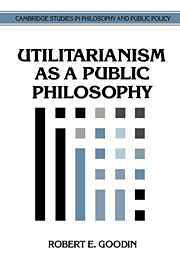Book contents
- Frontmatter
- Contents
- Preface
- Acknowledgments
- PART I INTRODUCTION: MORAL BASES OF STATE ACTION
- PART II MORALITY, PUBLIC AND PRIVATE
- PART III SHAPING PRIVATE CONDUCT
- PART IV SHAPING PUBLIC POLICIES
- 8 Liberalism and the best-judge principle
- 9 Laundering preferences
- 10 Heroic measures and false hopes
- 11 Theories of compensation
- 12 Stabilizing expectations
- 13 Compensation and redistribution
- 14 Basic income
- 15 Relative needs
- 16 What is so special about our fellow countrymen?
- 17 Nuclear disarmament as a moral certainty
- 18 International ethics and the environmental crisis
- References
- Name index
11 - Theories of compensation
Published online by Cambridge University Press: 28 January 2010
- Frontmatter
- Contents
- Preface
- Acknowledgments
- PART I INTRODUCTION: MORAL BASES OF STATE ACTION
- PART II MORALITY, PUBLIC AND PRIVATE
- PART III SHAPING PRIVATE CONDUCT
- PART IV SHAPING PUBLIC POLICIES
- 8 Liberalism and the best-judge principle
- 9 Laundering preferences
- 10 Heroic measures and false hopes
- 11 Theories of compensation
- 12 Stabilizing expectations
- 13 Compensation and redistribution
- 14 Basic income
- 15 Relative needs
- 16 What is so special about our fellow countrymen?
- 17 Nuclear disarmament as a moral certainty
- 18 International ethics and the environmental crisis
- References
- Name index
Summary
From a moral point of view, the function of compensation is straightforward. Compensation serves to right what would otherwise count as wrongful injuries to persons or their property. That is the role of “compensatory damages” in the law of torts and of “just compensation” for public takings of private property. And that is what the New Welfare Economists were relying on when making the possibility of gainers compensating losers the proper measure of permissible policies.
It would, however, be wrong to presume that we as a society can do anything we like to people, just so long as we compensate them for their losses. The subset of the policy universe to which such a proposition properly applies – policies that are “permissible, but only with compensation” – is bounded on the one side by policies that are “permissible, even without compensation,” and on the other side by policies that are “impermissible, even with compensation.”
There clearly are some things that we as a society can do to people without compensating them in any way for their ensuing losses. The state need not compensate people who are stopped from endangering the public health, safety or welfare. No one expects state inspectors to compensate owners of unsanitary restaurants or unsafe factories they close down. No one supposes that the legitimacy of public health authorities putting victims of smallpox into quarantine is in any way contingent upon compensation being paid to them for lost wages.
- Type
- Chapter
- Information
- Utilitarianism as a Public Philosophy , pp. 160 - 180Publisher: Cambridge University PressPrint publication year: 1995



